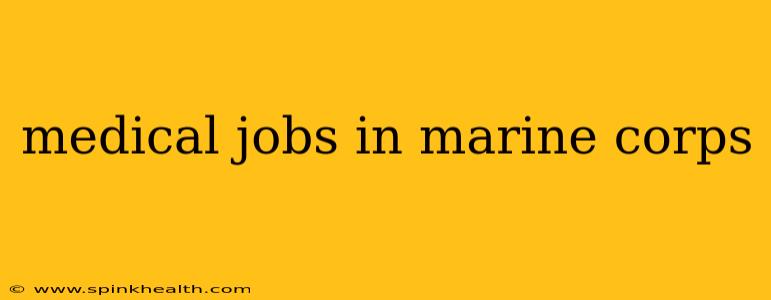The call of duty extends beyond the battlefield. For those with a passion for medicine and a spirit of service, the United States Marine Corps offers a unique and challenging career path. While the image of a Marine often conjures up scenes of combat, the Corps also boasts a robust and vital medical community, providing critical care to Marines and sailors worldwide. This isn't just about patching wounds; it's about comprehensive healthcare, from preventative medicine to advanced surgical procedures, all delivered in dynamic and demanding environments.
Let's embark on a journey to explore the diverse medical jobs available within the Marine Corps, understanding the training involved, the career progression opportunities, and the rewarding experience of serving your country while making a profound impact on the lives of others.
What Medical Jobs Are Available in the Marine Corps?
The Marine Corps needs a wide range of medical professionals to support its operational readiness. The opportunities are diverse, catering to various interests and skill sets. From hands-on care to administrative support, there's a role for everyone, including:
- Physicians: Whether specializing in family medicine, surgery, or another area, physicians in the Marine Corps provide essential care to service members and their families.
- Physician Assistants (PAs): Working under the supervision of physicians, PAs provide valuable medical services, including diagnosing illnesses, performing procedures, and prescribing medications.
- Registered Nurses (RNs): The backbone of any medical system, RNs are crucial for providing direct patient care, administering medications, and monitoring patient conditions.
- Medical Service Corps Officers: This encompasses a wider range of roles, including medical administrators, logistics specialists, and operational medicine planners.
- Dental Officers: Ensuring the oral health of Marines is vital, and dental officers play a critical role in maintaining dental readiness.
- Medical Technicians: These skilled professionals assist physicians and nurses, performing various tasks from drawing blood to preparing patients for surgery. This includes specializations like surgical technicians and respiratory therapists.
- Corpsmen (Hospital Corpsmen): While technically Navy personnel, Hospital Corpsmen serve alongside Marines and provide a significant portion of the medical support in units. They are highly trained medics.
What is the Training Like for Medical Jobs in the Marine Corps?
The training required will vary greatly depending on the specific medical role. However, all medical personnel undergo rigorous training to ensure they're prepared for the challenges of military service. This often includes:
- Basic Military Training (Boot Camp): All Marines, regardless of their specialty, must first complete rigorous basic training.
- Medical-Specific Training: Following boot camp, aspiring medical professionals will undergo extensive training specific to their chosen field. This might involve attending medical school, completing residency programs, or specialized training at military medical facilities.
- Combat Medic Training: Many roles will incorporate specific training in providing care under combat conditions.
How Long Does it Take to Become a Doctor in the Marine Corps?
This is dependent upon your pre-existing medical qualifications. If you're already a qualified physician, your training will focus on integration into the Marine Corps medical system and potentially specialized military medical training. If you're not yet a physician, you'll have to complete medical school and residency, before applying for a commission in the Marine Corps.
What are the Benefits of a Medical Career in the Marine Corps?
A career in the Marine Corps medical field offers unparalleled opportunities:
- Serving Your Country: The most significant benefit is the opportunity to contribute to national security while providing vital medical care.
- Competitive Salary and Benefits: The Marine Corps provides excellent pay, benefits (health insurance, retirement plan, etc.), and opportunities for professional growth.
- Travel and Experience: Deployments offer the chance to see the world and gain valuable experience in diverse medical settings.
- Advanced Training and Education: The Marine Corps invests in its personnel by providing opportunities for continuing education and specialized training.
What are the Requirements for Medical Jobs in the Marine Corps?
The specific requirements will vary depending on the chosen medical field. However, general requirements might include:
- US Citizenship: You must be a US citizen to serve in the Marine Corps.
- Education and Licensing: Appropriate medical licenses and degrees are required for most roles.
- Physical Fitness: Meeting certain physical fitness standards is essential.
In conclusion, a medical career within the Marine Corps is a path of service, sacrifice, and significant reward. It demands dedication, skill, and a willingness to embrace unique challenges. For those who answer the call, the opportunity to heal, to lead, and to serve their country in such a meaningful way is an exceptional honor.

